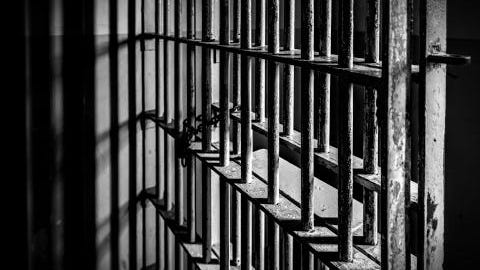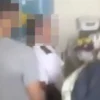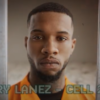In the wake of multiple shooting incidents over the Independence Day weekend, political officials in Washington D.C. and Maryland have announced new law and order policies to increase policing and toughen punishments for those facing criminal charges.
In an interview with the Washington Post posted July 11, Maryland’s Democratic Governor Wesley Moore said the mass shooting in Baltimore’s Brooklyn neighborhood, which left two people dead and 28 injured at an annual block party, raised the need for an “all of the above” strategy.
“You cannot violate the safety of our community and think there will be little or no accountability for it,” Moore declared. “These people who are repeat violent offenders, I want them to know we’re coming for them.” Moore said that for those accused of repeat violent crimes, he would work with the state legislature to ensure their “days are done.”
The Post described Moore’s plan to “blunt crime” as a development that emerged “only recently,” calling his remarks “tougher-on-crime” compared to his rhetoric before he was elected. “Six months ago,” the publication says, Moore campaigned “in part on pledges to tackle intractable problems that include racial disparities in the state’s criminal justice system.”
Moore, the first African American governor in Maryland’s history, ran his election campaign last year pledging to reform probation and parole proceedings and “improve” relations between police and communities. Just last month, Moore said at an event with his Cabinet that “better access to jobs, education, and opportunity” reduces crime, calling for “the kind of foundational investments that will break down that pipeline from poverty to prison.”
Moore, sensing his own hypocrisy in responding to rising crime with law and order tactics, made claims that his focus was on “improving the quality of life” when he visited the site of the shootings earlier this month. “We’re here to say that this is not just the response to an incident. This is about how we are actually improving the quality of life for everybody for good. … We just cannot continue going from tragedy to tragedy,” he declared.
Moore said it is a “false choice” to claim tougher policing cannot occur at the same time as criminal justice reform to reduce racial disparities in arrests and sentencing. In Maryland, black people account for 71 percent of the prison population, despite making up only 29 percent of the state population overall.
Moore’s argument that the state can crack down on crime resulting from economic deprivation while simultaneously alleviating poverty is an utter lie. The governor heads a state which presides over immense social inequality and uses the police as its armed body of men to enforce this inequality and keep order. In Baltimore, one in five people live below the poverty line. This is almost double the national poverty rate of 11.6 percent.
In the Baltimore neighborhood where the mass shooting left 28 injured and 2 dead earlier this month, childhood poverty stands at about 50 percent, with about a quarter of children living without internet access.
What Moore actually means in calling the trade-off between harsher policing and criminal justice reforms a “false choice” is that the state intends to emphasize law and any “reforms” will be pushed off of the agenda completely.
Similar processes have occurred in Washington D.C.
Over the July 4 holiday weekend, there were multiple shooting deaths in the city, including the killing of Lyft driver Nasrat Ahmad Yar and, separately, the death of teacher Maxwell Emerson on the campus of Catholic University. The Metropolitan Police Department have recorded a 17 percent increase in homicides this year compared with 2022, while violent crime has risen 33 percent.
Last week, the City Council and Democratic Mayor Muriel Bowser passed an emergency crime bill that gives police more leeway for the next 90 days in detaining people ahead of trial rather than granting bail, a measure which will fuel mass incarceration. The bill allows the District to adopt a presumption of pretrial detention for individuals, including children, accused of violent offenses. It also facilitates city prosecutors’ access to private security camera footage and the usage of pretrial ankle monitor tracking data once a case goes to trial.
Bowser said last week at a press conference with the bill’s sponsor, Democratic Ward 2 Council Member Brooke Pinto, “The criminal activity occurring in our neighborhoods is unacceptable.” She hailed its passage later that day as an “agreement that the status quo is unacceptable.”
The bill is modeled off of an even more authoritarian package introduced by Mayor Bowser which would allow pretrial jailing for all individuals suspected of violence regardless of their age. “Pinto’s emergency legislation is not quite as hard edge as Bowser’s,” writes the Post, because the Pinto bill requires that the individual must have also been armed.
Council members voting for the emergency measure included so-called “progressive” members of the council. Zachary Parker, a Democrat who was endorsed by the Democratic Socialists of America, said he had concerns about the proposed emergency measures against crime but that he had come around to supporting it after discussions with Pinto.
Last year, the DSA supported and campaigned for Parker on the grounds that his candidacy was a “massive opportunity for the progressive left to elect an uncompromising champion for our values.”
Brianne Nadeau, Council Member for Ward 1, called the bill proof the City Council is taking action “in addressing public safety.” Nadeau was reelected last year with the support of the city’s local AFL-CIO council, United Food and Commercial Workers Local 400, the Service Employees International Union, the Bernie Sanders-aligned Our Revolution and the local chapter of the Sunrise Movement.
Bowser and Pinto had hoped to move the emergency bill through the Council without amendment, but Council Member Janeese Lewis George objected to the bill, calling it unnecessary given the lasting damage pretrial detention can cause for people who may lose their house or children while in jail waiting for their court appearances.
Lewis George, who also is endorsed by the local chapter of the DSA and Black Lives Matter, proposed an amendment striking the provision for pretrial detention of all violent offenders. Her proposal went down with one single supporting vote from former mayor Vincent Gray, now Ward 7 councilman.
Ward 3 Council member Matthew Frumin, another “progressive,” voted against Lewis George’s amendment and for the legislation despite vague criticism that the emergency bill was “overbroad.”
Despite her stated opposition to pretrial jailing, Lewis George’s proposed amendment accepted the other elements of the legislation. During last year’s general election, Lewis George endorsed Nadeau, Frumin and Parker. All supported the law in its entirety.
This post was originally published on this site be sure to check out more of their content.














